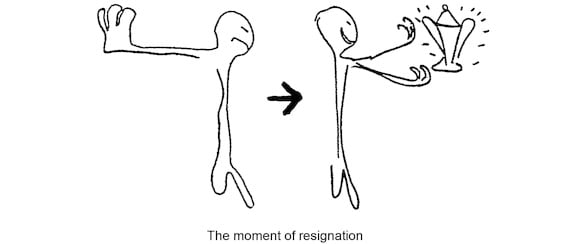Lifting the Burden of Guilt
This blog post was written by Anthony on 25th November 2016
“Guilt upon the conscience, like rust upon iron, both defiles and consumes it, gnawing and creeping into it, as that does which at last eats out the very heart and substance of the metal.” (Robert South, English clergyman, 1727)
Being brought up as a Catholic I have a fairly good handle on the whole guilt thing. Going to Mass every week was the expected thing to do and it seemed as though at least every second Sunday the sermon would cover the topic of sin, including the age-old line ‘We are all sinners!’. I would inevitably take to heart the intended message. Introspection would likely ensue, and the guilty feelings would bubble-up and coarse through me as I ruminated on my latest mistake. It’s going back quite a long time, but it’s possible that I only ever felt normal if I was holding onto some type of guilt.
I can clearly remember a ‘fork in the road’ moment as a young teenager when I was riding my bike down a long steep hill not far from home. At the bottom of this hill was the local retirement home. I remember thinking to myself: ‘Maybe I should volunteer to visit here and spend some time talking with the elderly people?’. I’m sorry to admit, I did not answer myself in the affirmative. That I remember this quite well speaks to the fact that it was a key moment in my life. Basically I think of it as the time when I literally decided to ‘look out for Number One’, and over-ride any feelings of guilt—although they were always there beneath the surface. I’m not sure, but I imagine that other people would also be able to recall a similar pivotal moment in their life.
So for me, it was a red letter day, when, at the age of 29, I came across Jeremy Griffith’s Beyond The Human Condition. I really devoured this book. It all made so much sense— even though I had never even heard of the subject of the ‘human condition’ before. To discover for the first time the concept of ‘Resignation’ was key—it was the unlocking point to understanding myself, others, and our condition. I love this excerpt from the book about Resignation because the logic struck such a chord with me at the time:
“The critical psychological point in our lives came when we resigned ourselves to reality. We were born into the world expecting it to be ideal and still like it was before upset appeared, only to discover it wasn’t. At first we asked why it wasn’t ideal. We asked ‘Mummy, why do you and Daddy shout at each other?’ and ‘why are we going to a lavish party when that family down the road is living in poverty?’ and ‘why is there so much emphasis in the world on sex?’ and ‘why do men kill one another?’ and ‘why is everyone so unhappy and preoccupied?’ and ‘why is everyone so artificial and false?’. Unable to explain their upset world adults could only say something bewildering like ‘one day child you will learn life is more complex than it first appears’. In fact we soon learnt that for some reason, no-one wanted to hear these, what are in truth the real questions about human life.
While we stopped asking these questions that adults seemed to find so unsettling we continued to think them. Eventually, normally at about the age of sixteen, the time came when we decided we had to stop worrying about reality and just resign ourselves to it, as everyone else was doing. Usually what finally convinced us of the need to block out ideality was the discovery within ourselves of a depressing lack of idealism. We discovered the human condition without and within.
So we sensibly resigned ourselves to reality. We practised evading the unanswerable questions about the contradictory nature of human behaviour. Eventually the hypocrisy became invisible to us…” (Beyond The Human Condition, pages 79-80)
Ah yes, the ‘depressing lack of idealism’ that my ‘fork in the road’ decision epitomized! Whilst not condoning such behaviour, the significance of the concept of Resignation is that it explains how losing our idealism was an unavoidable part of humans’ necessary search for knowledge. So while I can look at the religious teachings I absorbed in my youth, and appreciate the profundity of what I was taught, I now know that in order to truly liberate ourselves from our condition we needed more than warnings about our so-called ‘fallen’, ‘sinful’ or ‘evil’ state, or absolution for our transgressions—we needed biological understanding of the source of our lack of ideality.
Understanding Resignation has just made so much sense of my own situation. It allows me to understand, almost within the very moment, what is going on when I’m feeling guilty. With this profound explanation and ultimate defence of my fallibility the age-old spiral of recrimination doesn't take hold. I can see and admit the error in my ways. I have the knowledge that I am fundamentally good. I have a means to resist the ‘rust upon iron’. I can get on with being a better person, part of the greater good. It is truly liberating.
Our situation—now that we have understanding of our fundamental goodness, enables such a paradigm shift in our self-acceptance. The following excerpt from Jeremy’s recent book FREEDOM : The End of the Human Condition really captures this:
“This fact of the utter magnificence of the human race—that we can now understand and know is true rather than merely hope it is so—brings such intense relief to our angst-ridden cells, limbs and torsos that it will feel as though we have thrown off a shroud of heavy chains. The great, heavy burden of guilt has finally been lifted from the shoulders of humans. Yes, doesn’t the core feeling exist in all humans that far from being meaningless, ‘banish[ment]’-deserving ‘evil’ blights on this planet we are all immense heroes? Doesn’t this explanation at last make sense of all humans’ immensely courageous and defiant attitude? And won’t this explanation bring deep, bone-draining relief to the whole of each person’s being?” (FREEDOM: The End Of The Human Condition, para 292 )
Yes, the ‘burden of guilt’ has finally been lifted! All humans are good! All humans are ‘immense heroes’! We can cast off the psychological chains that have held us back for so long. The following excerpt from WTM member Stacy Rodger’s affirmation reinforces this:
“I’m drenched by this overwhelming feeling of never having to worry about whether I’m good or bad ever again. That’s a question I never have to ask again because I’m good, we are all good…
The best bit about it is that we all have different circumstances having lived life under the duress of the human condition that make us different, but that doesn’t mean being resigned or carrying more hurt or upset makes us bad. We are all dignified and loved, every single one of us. Every human that has walked the Earth has done the most incredible job, we have not one thing to worry about ever again. We are safe as houses. None of this cyclone that has been our lot prior to the human condition being solved is our fault.
I know that humanity’s future is utterly glorious and I get so happy all I want to do every day is dance because it has totally TRANSFORMED my life. We are all so defended, every single one of us and I always thought that would never happen.” (Freedom: Expanded Book 2, Section 3:3))
Stacy is right—when we allow this information into our lives, whilst still fallibly human, we are completely defended. Defended. Free. Transformed.






Please wait while the comments load...
Comments